As`ad AbuKhalil looks back on a Palestinian who was among a group of leaders to emerge after 1948 and dedicate themselves to liberating their homeland.
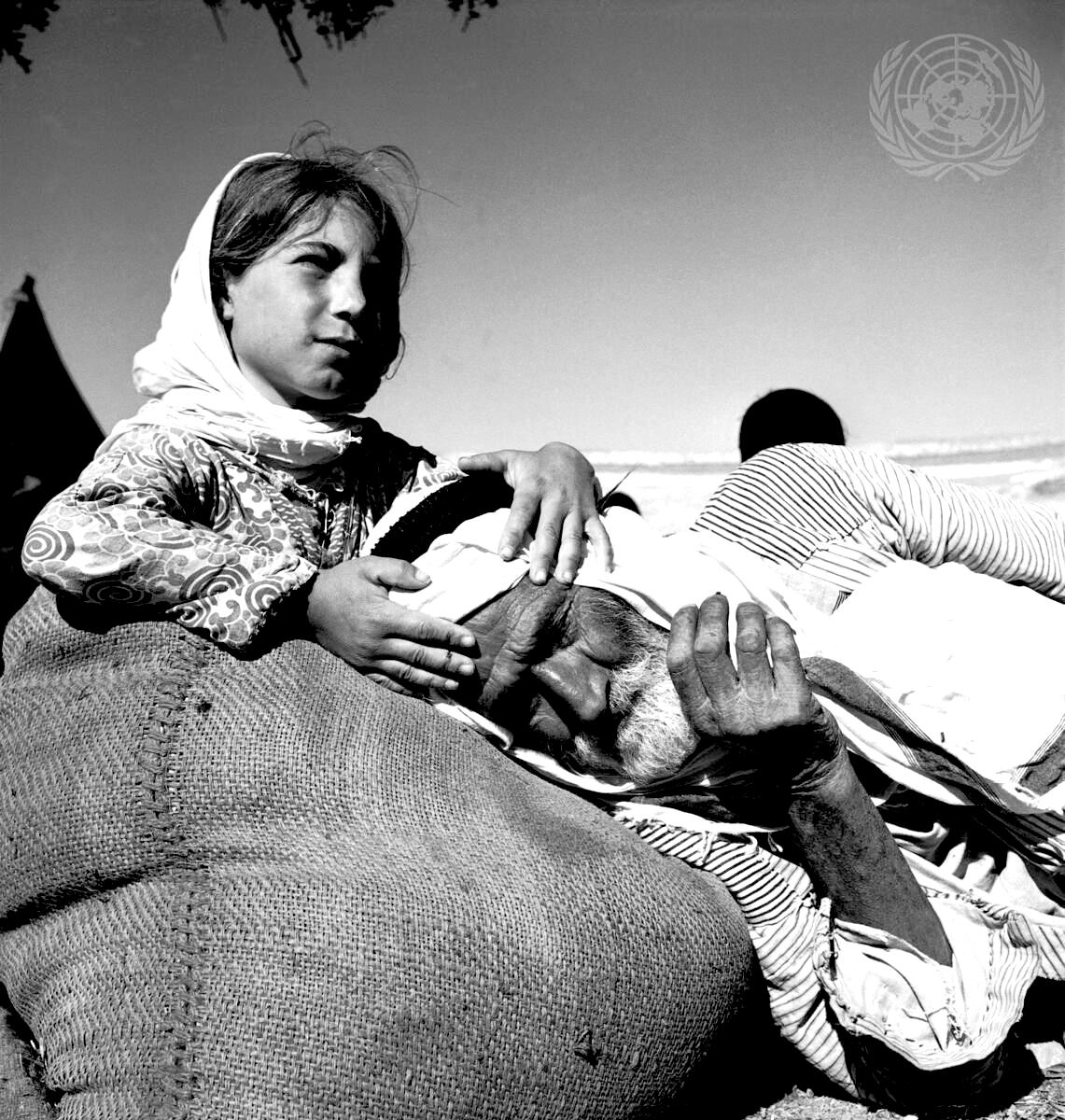
Palestinian refugees in Lebanon, 1948. (UN Photo)
By As`ad AbuKhalil
Special to Consortium News
 The world of Palestinian politics has changed enormously: the Oslo agreements were intended to smash the Palestinian liberation movement and to assign to the Palestine Liberation Organization (PLO) a new mission: that of policing the Palestinian people on behalf of Israel.
The world of Palestinian politics has changed enormously: the Oslo agreements were intended to smash the Palestinian liberation movement and to assign to the Palestine Liberation Organization (PLO) a new mission: that of policing the Palestinian people on behalf of Israel.
After 1948, there emerged a generation of Palestinians — leaders and ordinary people — who dedicated their lives to the liberation of their homeland — by all means necessary. Not all methods or efforts of liberation were laudable or constructive or wise, but at least there were genuine attempts to achieve victory against the Israeli occupation state.
Those were the men who were either youngsters when Israel was established over Palestine in 1948, or were men (unfortunately the founders of political organizations were all men although women participated in the struggle in all its phases) who grew up in refugee camps after the Nakbah.
Those men were obsessed with the national goal of liberation, and many had ideas of revenge (the Movement of Arab Nationalists had “revenge” as a goal in its motto).
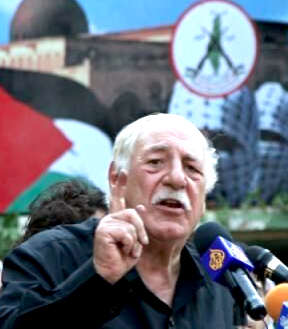
Ahmad Jibril in undated photo. (Master Strategist, Historica Wiki, CC-BY-SA)
George Habash and his comrades among the founders of the Movement of Arab Nationalists, were Palestinians who either witnessed the Nakbah first hand (Habash’s sister died shortly after the Nakbah, when Zionist gangs led by Yitzhak Rabin ethnically cleansed the Lydda area where Habash’s family resided) or they were Palestinians who experienced the miserable life of forced exile in squalid refugee camps or in Arab cities.
Ahmad Jibril, who died on July 7, was one of those men. He hailed from Yaffa and he was a boy when Palestine was occupied in 1948. His family moved to Syria where received his education, and attended the military academy in Homs. His experience in Syria shaped his political thinking and outlook and he remained loyal to the Baathist regime of Hafiz Al-Asad and his son, Bashshar, for much of his political life.
Jabril was never a Baathist and yet was closer to the regime than many Arab Baathists. He was very hard to pin down ideologically. He founded the Palestinian Liberation Front in 1959, and in 1965 it briefly merged with the Fatah Movement. But Jibril was not a man to take orders (except from the Syrian regime); he split off from Fatah, and he never got along with other Palestinian leaders.
The problem of infighting and competition among Palestinian national leaders characterized the modern history of Palestinian national struggle.
In 1967, Jibril joined the newly-formed Popular Front for the Liberation of Palestine which was led by Habash. The PFLP and the Fatah Movement were two Palestinian organizations (among others) which basically proposed guerrilla warfare against Israeli occupation.
The Palestinian people as a whole were fascinated by the Viet Cong and also by Algerian national liberation and wanted to model their political and military movement after those two historical examples. The PFLP was the most radical as it proposed a war on Israel and on all Arab “reactionary” regimes which obstructed revolutionary activities.
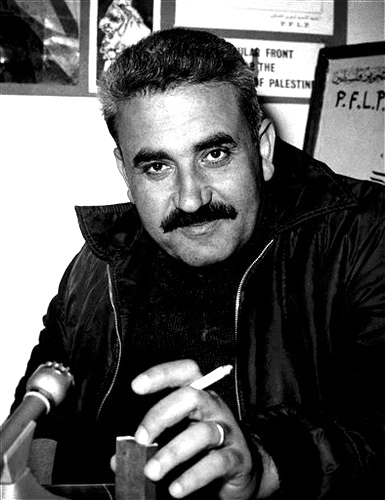
George Habash in 1969. (Dahnoon, Wikimedia Commons)
Habash declared that the path of Palestine’s liberation must necessarily pass through Arab capitals, with the exception — according to the PFLP — of those petit-bourgeois regimes which aided the revolution (a reference to the military regimes in Syria, Iraq and Egypt).
Fatah was more moderate and compromising: it was receiving the bulk of its aid from Gulf countries and Yasser Arafat (the Fatah leader) was beholden to the anti-revolutionary agenda of Saudi Arabia and other Gulf monarchies. How could Arafat lead what he called “a Palestinian revolution” while constantly making sure that the Saudi regime remained his patron?
The Saudis, of course, exacted a heavy price from Arafat: They constantly pushed for compromise with Israel and also wanted Fatah to expand to undermine the growing power of the left, like the PFLP and the Democratic Front for the Liberation of Palestine.
The 1968 Split
The experience of Jibril within the PFLP was short-lived. In 1968, Jibril split off from the PFLP and took key military cadres who had formed the Palestinian Liberation Front with him. It was a major blow to the PFLP as it deprived it of a military commander who constantly designed ways to attack Israeli targets.
Jibril’s expertise was infantry and explosives and he put that expertise to use in his war against Israel. Jibril named his splintered organization, Popular Front for the Liberation of Palestine-General Command (PFLP-GC). The name was intended to show that he succeeded in drawing key military cadres from the PFLP and that he represented the authentic mission of the PFLP.
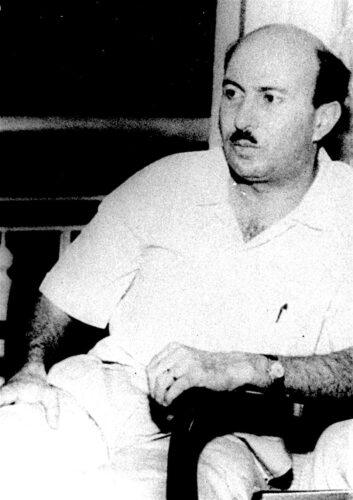
Wadie Haddad in Syria, around 1970. (Wikimedia Commons)
Within the PFLP Jibril did not feel at home. The new organization was undergoing a transformation from the ideology of Arab nationalism to the ideology of Marxism-Leninism. Jibril — like Wadi` Haddad, Habash’s chief comrade — never enjoyed ideological squabbles and believed that action was needed, and not theories and political argumentation.
It is said that Jibril engineered the first Palestinian hijacking although some accounts trace the first hijacking to the PFLP, under the guidance of Wadi` Haddad (Haddad, was a physician, like Habash with whom he studied at American University in Beirut). Jibril’s organization had nominal token adherence to leftism but its loyalty to the Syrian regime marked its policies.
I once asked a leading figure in the PFLP-GC, Anwar Raja, whether the organization had any disagreements with the Syrian regime of Asad in its entire history. He could only name two occasions: the 1976 Syrian intervention in Lebanon, when the Syrian regime supported the right-wing pro-Israeli militias against the PLO-Lebanese National Movement coalition; and the War of the Camps in 1985-1987, when the pro-Syrian Amal Movement brutally battled Palestinian organizations in the Palestinian refugee camps in Lebanon.
Spectacular Attacks
Jibril was known for designing spectacular attacks on Israeli targets, using a variety of means: boats, hang gliders and trained pilots in Libya on fighter jets. The organization started what became known as “fida’i operations” in Khalisa in northern Palestine (self-sacrifice operations, in reference to military operations in which perpetrators know beforehand that the chance of death is very high).
All PLO organizations would later adopt the same methods, although most were not successful and Israel military forces would shoot at Palestinians and Israelis alike (in the case of hostage-taking) and would later blame the Palestinians for the mayhem.
Jibril was an impatient man and he did not find it important to coordinate with other PLO leaders in military operations. In fact, all leaders of PLO organizations were guilty of lack of coordination and an intense state of disunity which was exploited by Arafat, who was eager (perhaps at the behest of his Gulf patrons) to distract and paralyze the Palestinian left. Arafat would usually buy off the second in command in most of those organizations.
Jibril’s organization was rather small but was considered militarily more experienced and capable than other organizations. But Jibril developed a reputation as a gun-for-hire because he agreed to perform operations on behalf of the Syrian regime or even Qadhdhafi’s Libya. Qadhdhafi was enamored with Jibril and his organization and he supplied them with generous financial and military support.
When the Iranian revolution succeeded in toppling the Shah, Jibril was inspired and his ideology underwent major transformation, as he adopted a version of Islamist ideology which did not contradict his staunch support for the Syrian regime. Jibril managed to be loyal to the Libyan, Syrian and Iranian regimes simultaneously.
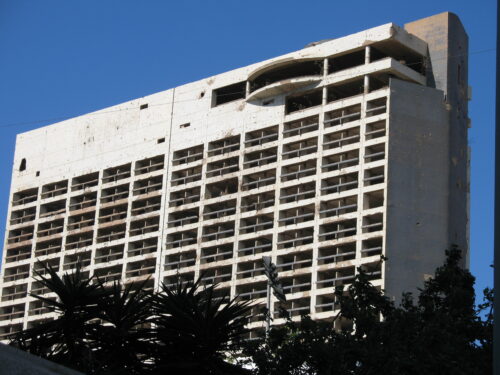
The Holiday Inn Beirut, which was used as a vantage point for militias and was badly damaged during the 1975-76 Battle of the Hotels, in 2010. (Catfish Ramblant, CC BY-SA 2.0, Wikimedia Commons)
Jibril established his home base in the Yarmuk camp outside of Damascus. During the Lebanese civil war, PFLP-GC played a major role in the battles of Beirut, especially the “War of the Hotels” in 1976. Jibril led his fighters, and those from other Palestinian organizations and succeeded in expelling pro-Israeli militias in the area (Jibril would never take credit for that battle until many years later, and allowed the Lebanese militias — like the Murabtun — to take credit for a battle in which they had little participation).
Jibril solidified his reputation as a staunch defender of Damascus when he fought other Palestinian organizations and Syrian rebels during the Syrian war after 2011. While all Palestinian organizations (including the Palestinian Authority) have eulogized Jibril and paid tribute to his role, many supporters of the Syrian armed opposition heaped scorned on him after his death a week ago.
Jibril may have been a brilliant military innovator but his legacy is marred by his loyalty to repressive regimes, and his undertaking special missions on behalf the intelligence services of those regimes. His organization is unlikely to last long after his death as Israel killed his heir apparent son, Jihad, in 2002 in a car bomb in Beirut.
But the history of Palestinian struggle for liberation is full of organizations that came and went, and new organizations always form to take on the new challenges of facing a brutal Western-supported occupation.
As`ad AbuKhalil is a Lebanese-American professor of political science at California State University, Stanislaus. He is the author of the Historical Dictionary of Lebanon (1998), Bin Laden, Islam and America’s New War on Terrorism (2002) and The Battle for Saudi Arabia (2004). He tweets as @asadabukhalil
The views expressed are solely those of the author and may or may not reflect those of Consortium News.

The PFLP-GC deserves to outlive its founder. Most people in the West (if they have even heard of it) regard the PFLP-GC as a historical relic, but Palestinians in Syria know it as the organisation that liberated the Yarmuk refugee camp from ISIS. Being real revolutionaries, Jibril and the PFLP-GC could tell the difference between a revolution and a Western-backed contra operation, regardless of their Syrian patron’s views on the matter.
If you have time for a long read:
hXXps://libertarianinstitute.org/articles/a-brief-history-of-the-destruction-of-yarmouk/
Thanks for another history lesson.